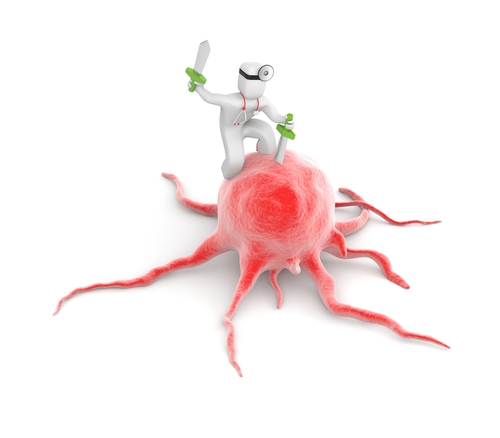CDK4/6 protein inhibitors, which have proven effective against some cancers, might be a way to treat malignant mesothelioma, according to a review in the journal Genes & Cancer.
They called for Phase 3 clinical trials of CDK4/6 inhibitors, either as stand-alone therapies or combined with other drugs, to see if they would work against mesothelioma. Their review was titled “Cyclin dependent kinase 4 and 6 inhibitors as novel therapeutic agents for targeted treatment of malignant mesothelioma.”
Previous studies have reported that the CDKN2A gene generates less p16 protein in mesothelioma.
The protein helps regulate the process by which cells divide and generate new ones by controlling the activity of CDK4 and CDK6 proteins. If p16 is faulty, CDK4 and CDK6 become too active in the cell cycle process, leading to cancer development.
“Two recent studies found that 52.2 percent and 45 percent” of mesotheliomas had deletions in portions of DNA containing the CDKN2A and CDKN2B genes, the researchers wrote.
Another study confirmed the key role that cell cycle dysregulation plays in the development of mesothelioma, the team noted. It showed a correlation between levels of p16 and patients’ response to chemotherapy — and thus to their survival.
The U.S. Food and Drug Administration has approved two anti-CDK4/6 inhibitors — Ibrance (palbociclib) and Kisqali (ribociclib) — as treatments for metastatic breast cancer. Those approvals support the notion that inhibiting the CDK4 and CDK6 proteins could be a good way to treat mesothelioma, the researchers said.
Additional support for the idea comes from research showing that CDK4/6 inhibitors eradicated three types of mesothelioma cells grown in a lab, the team added.
“After such promising results, a phase II clinical trial has been designed to evaluate the CDK 4/6-inhibitor [Kisqali] in solid tumors, including MM, carrying relevant CDK4/6, cyclin D1/3 or p16 aberrations (NCT02187783),” the researchers wrote.
“Our report would support the need for randomized phase III clinical studies specifically designed to test the anti-tumor activity of CDK4/6 inhibitors as single agents or in combination in MM on the basis of the molecular characteristics of this tumor,” they concluded.



One comment